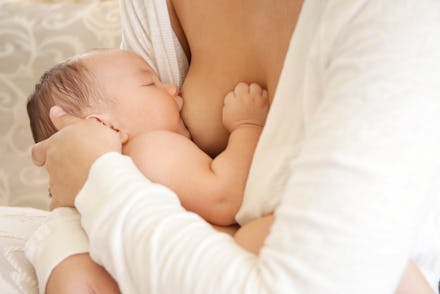Universal Breastfeeding Could Prevent 13% of Children From Dying Before Age 5

It's no secret that breastfeeding is healthy — not just for babies, but for mothers too.
And yet for U.S. mothers, breastfeeding a baby is no easy feat. From the lack of paid maternity leave to the rampant stigma against women who breastfeed their babies in public, the breastmilk barriers are numerous.
We could be approaching a tipping point, thanks to a comprehensive two-part Lancet series on the enormous health benefits of breastfeeding. The new papers compiled data from more than 1,300 different breastfeeding studies, some commissioned for this series, according to CNN.
The studies yielded many compelling findings, including this stunning fact: If every mother in the world breastfed her child, more than 800,000 infant deaths could be prevented each year — or 13% of all deaths of children under age 5. Universal breastfeeding could also prevent 20,000 moms from dying of breast cancer each year.
Breastfeeding has a plethora of proven health benefits for babies and their moms. In babies, it's been shown to promote healthy growth, as well as protect against illness such as asthma and lower respiratory infection. In mothers, it can prevent diabetes, heart disease, breast cancer and ovarian cancer.
The Lancet series also found a link between breastfeeding and babies' intelligence later in life. Using data on newborns collected in 1982 in Brazil, researchers examined how 30 years later, people's IQ, years of schooling and income correlated to whether or not they were breastfed as babies.
You can probably guess the results: Babies who were fed breastmilk exclusively or predominantly tended to have greater IQ scores, educational attainment and income.
Given all the benefits of breastfeeding, why aren't U.S. women doing it more? The World Health Organization recommends mothers exclusively breastfeed for the first six months of their baby's life. Globally, 38% of babies meet that requirement. But here in the U.S., only 16.4% of babies are exclusively breastfed at 6 months, according to the Centers for Disease Control and Prevention.
One of the major reasons U.S. women can't breastfeed their babies, as STAT reported, is that the vast majority of them are denied paid maternity leave. Only 13% of Americans have access to paid family leave after the birth of a child, according to the National Partnership for Women and Families.
Many women across the country are forced to make a terrible decision: stay home and breastfeed or continue earning a full salary.
"Pediatricians agree it's important to breastfeed babies, if you can, and it is flat-out impossible for many women to do so without access to paid family leave," Kristin Rowe-Finkbeiner — executive director and CEO of MomsRising.org, an advocacy group for women, mothers and families — told Mic.
As it stands, many women across the country are forced to make a terrible decision: stay home and breastfeed or continue earning a full salary.
"We hear from a lot of moms who do want to breastfeed their children and need to be back to work fairly immediately and struggle with finding ways to continue feeding through pumping or other ways," Rowe-Finkbeiner said.
"The other issue is that breastfeeding can be a little like rocket science — it's not always easy," she continued. "Having time to establish breastfeeding patterns with an infant is critically important."